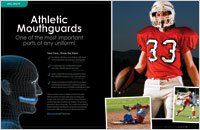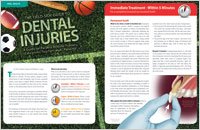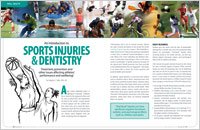Mouthguards for Adults
Home > Mouthguards for Adults
Today, most adults understand the importance of leading a healthy, active lifestyle. Regular exercise has been shown to lower blood pressure, maintain healthy cholesterol levels, and even improve mental health.
It is estimated that some 150 million U.S. adults get involved in some form of physical recreation (including sports) each year.
Each year, some of those same people wind up requiring treatment for dental injuries related to sports and activity.
Which adults are prone to traumatic dental injury?
Men may be slightly more likely to suffer from traumatic dental injury. Both sexes experience a drop in likelihood following the teen years. It may seem that contact sports like football and hockey are the most likely suspects, but this is not the case. Adult males are far more likely to be injured while playing basketball!
The American Dental Association (ADA) has identified more than two dozen sports as potential sources of dental injury. These sports include baseball, martial arts, bicycling, handball, skiing, and equestrian sports. To prevent injuries, ManiDental Family Practice offers mouthguards for adults in Elkin, NC.
There is no question that the benefits of physical activity substantially outweigh the risk of injuries. Nevertheless, serious dental injury can result in pain, time taken away from work and family, and high treatment costs. Those treatment costs are frequently not covered by insurance.
If you had a piece of equipment that is endorsed by the ADA and can reduce the risk of injury by 60 times, would you use it?
An Invaluable Part of Your Sports Gear: The Mouthguard
A quality, custom-made mouthguard should be a part of every athlete’s equipment. Mouthguards are small protective devices that sit over your teeth and absorb the force of an impact. Protecting against that force shelters the mouth from sustaining damage and reduces the likelihood of needing emergency services.
Before selecting a mouthguard, it is important to determine which type of mouthguard best suits individual needs. Mouthguards currently on the market include:
- Generic mouthguards. These are the guards usually found in sports retail stores and big-box stores. Generic mouthguards are inexpensive and come in different sizes. They are held in place by being clenched between teeth. While many people rely on these types of guards, they can be uncomfortable and their construction materials are not always ideal.
- Boil and bite guards. Boil and bite guards are designed to conform to the shape of a customer’s teeth. Guards are set in hot water, then placed in the mouth. Your fingers, teeth, and tongue are then used to mold the guard to the shape of your jaw to create a more customized fit. These are more customized, but there is still quite a bit of variation in quality and efficacy.
- Custom made mouthguards. Custom mouthguards are made for a specific client or customer. A mold of teeth is taken before the custom mouth guard is constructed. These guards are strong, lightweight, and comfortable. The more comfortable guards are, the more likely athletes are to actually wear them.
Custom mouthguards are invaluable pieces of equipment. They can save you the inconvenience and cost of restoring or replacing damaged teeth. If you are known for playing sports, wearing a mouthguard is an important part of maintaining your oral health and protecting your smile.
Custom mouthguards are the best way to prevent dental injuries from spoiling your game.
Related Articles
Athletes often feel invincible. They may feel they are able to run, jump, and hit perfectly in every game. Unfortunately, statistics show that accidents can happen to anyone.
An ounce of prevention can do a world of good in maintaining healthy smiles.
Sports activities are prone to cause tooth and jaw damage. Appropriate dental attention can save pain, reduce anxiety, and reduce the likelihood of needing costly treatments. This field guide provides simple rules to follow to prevent injury.
Fortunately, dental injuries derived from sports are easy to treat and usually yield positive outcomes. If treated quickly, most patients recover from their dental injuries without issue.
Dentistry You Can Trust for the Whole Family
Testimonials




















